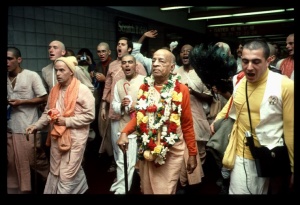CC Adi 16.59: Difference between revisions
m (1 revision(s)) |
(Vanibot #0054 edit - transform synonyms into clickable links, which search similar occurrences) |
||
| (One intermediate revision by one other user not shown) | |||
| Line 1: | Line 1: | ||
{{ | [[Category:Sri Caitanya-caritamrta - Adi-lila Chapter 16|C059]] | ||
<div style="float:left">'''[[Sri Caitanya-caritamrta|Śrī Caitanya-caritāmṛta]] - [[CC Adi|Ādi-līlā]] - [[CC Adi 16|Chapter 16: The Pastimes of the Lord in His Childhood and Youth]]'''</div> | |||
<div style="float:right">[[File:Go-previous.png|link=CC Adi 16.58|Ādi-līlā 16.58]] '''[[CC Adi 16.58|Ādi-līlā 16.58]] - [[CC Adi 16.60|Ādi-līlā 16.60]]''' [[File:Go-next.png|link=CC Adi 16.60|Ādi-līlā 16.60]]</div> | |||
{{CompareVersions|CC|Adi 16.59|CC 1975|CC 1996}} | |||
{{RandomImage}} | |||
==== TEXT 59 ==== | ==== TEXT 59 ==== | ||
<div | <div class="verse"> | ||
‘dvitīya śrī-lakṣmī’—ihāṅ ‘dvitīyatva’ vidheya | :‘dvitīya śrī-lakṣmī’—ihāṅ ‘dvitīyatva’ vidheya | ||
samāse gauṇa haila, śabdārtha gela kṣaya | :samāse gauṇa haila, śabdārtha gela kṣaya | ||
</div> | </div> | ||
| Line 12: | Line 16: | ||
==== SYNONYMS ==== | ==== SYNONYMS ==== | ||
<div | <div class="synonyms"> | ||
dvitīya śrī- | ''[//vanipedia.org/wiki/Special:VaniSearch?s=dvitīya&tab=syno_o&ds=1 dvitīya] [//vanipedia.org/wiki/Special:VaniSearch?s=śrī&tab=syno_o&ds=1 śrī]-[//vanipedia.org/wiki/Special:VaniSearch?s=lakṣmī&tab=syno_o&ds=1 lakṣmī]'' — the word ''dvitīya-śrī-lakṣmī'' (“a second all-opulent goddess of fortune”); ''[//vanipedia.org/wiki/Special:VaniSearch?s=ihāṅ&tab=syno_o&ds=1 ihāṅ]'' — this; ''[//vanipedia.org/wiki/Special:VaniSearch?s=dvitīyatva&tab=syno_o&ds=1 dvitīyatva]'' — the quality of being a second; ''[//vanipedia.org/wiki/Special:VaniSearch?s=vidheya&tab=syno_o&ds=1 vidheya]'' — the unknown, which is to be explained; ''[//vanipedia.org/wiki/Special:VaniSearch?s=samāse&tab=syno_o&ds=1 samāse]'' — in the compound word; ''[//vanipedia.org/wiki/Special:VaniSearch?s=gauṇa&tab=syno_o&ds=1 gauṇa]'' — secondary; ''[//vanipedia.org/wiki/Special:VaniSearch?s=haila&tab=syno_o&ds=1 haila]'' — ''became; ''[//vanipedia.org/wiki/Special:VaniSearch?s=śabda&tab=syno_o&ds=1 śabda]'' — artha''—the word’s intended meaning; ''[//vanipedia.org/wiki/Special:VaniSearch?s=gela&tab=syno_o&ds=1 gela]'' — became; ''[//vanipedia.org/wiki/Special:VaniSearch?s=kṣaya&tab=syno_o&ds=1 kṣaya]'' — lost. | ||
</div> | </div> | ||
| Line 19: | Line 23: | ||
==== TRANSLATION ==== | ==== TRANSLATION ==== | ||
<div | <div class="translation"> | ||
“In the word ‘dvitīya-śrī-lakṣmī’ [‘a second all-opulent goddess of fortune’], the quality of being a second Lakṣmī is the unknown. In making this compound word, the meaning became secondary and the originally intended meaning was lost. | “In the word ‘dvitīya-śrī-lakṣmī’ [‘a second all-opulent goddess of fortune’], the quality of being a second Lakṣmī is the unknown. In making this compound word, the meaning became secondary and the originally intended meaning was lost. | ||
</div> | </div> | ||
__NOTOC__ | |||
<div style="float:right; clear:both;">[[File:Go-previous.png|link=CC Adi 16.58|Ādi-līlā 16.58]] '''[[CC Adi 16.58|Ādi-līlā 16.58]] - [[CC Adi 16.60|Ādi-līlā 16.60]]''' [[File:Go-next.png|link=CC Adi 16.60|Ādi-līlā 16.60]]</div> | |||
__NOTOC__ | |||
__NOEDITSECTION__ | |||
Latest revision as of 18:33, 19 February 2024
Śrī Caitanya-caritāmṛta - Ādi-līlā - Chapter 16: The Pastimes of the Lord in His Childhood and Youth

His Divine Grace
A.C. Bhaktivedanta Swami Prabhupada
A.C. Bhaktivedanta Swami Prabhupada
TEXT 59
- ‘dvitīya śrī-lakṣmī’—ihāṅ ‘dvitīyatva’ vidheya
- samāse gauṇa haila, śabdārtha gela kṣaya
SYNONYMS
dvitīya śrī-lakṣmī — the word dvitīya-śrī-lakṣmī (“a second all-opulent goddess of fortune”); ihāṅ — this; dvitīyatva — the quality of being a second; vidheya — the unknown, which is to be explained; samāse — in the compound word; gauṇa — secondary; haila — became; śabda — artha—the word’s intended meaning; gela — became; kṣaya — lost.
TRANSLATION
“In the word ‘dvitīya-śrī-lakṣmī’ [‘a second all-opulent goddess of fortune’], the quality of being a second Lakṣmī is the unknown. In making this compound word, the meaning became secondary and the originally intended meaning was lost.